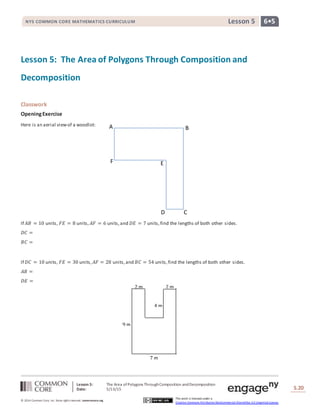
G6 m5-a-lesson 5-s
- 1. Lesson 5: The Area ofPolygons ThroughComposition andDecomposition Date: 5/13/15 S.20 20 © 2014 Common Core, Inc. Some rightsreserved. commoncore.org This work is licensed under a Creative Commons Attribution-NonCommercial-ShareAlike 3.0 Unported License. NYS COMMON CORE MATHEMATICS CURRICULUM 6•5Lesson 5 A B CD EF 4 m 2 m 2 m 7 m 9 m Lesson 5: The Area of Polygons Through Composition and Decomposition Classwork OpeningExercise Here is an aerial viewof a woodlot: If 𝐴𝐵 = 10 units, 𝐹𝐸 = 8 units, 𝐴𝐹 = 6 units,and 𝐷𝐸 = 7 units,find the lengths of both other sides. 𝐷𝐶 = 𝐵𝐶 = If 𝐷𝐶 = 10 units, 𝐹𝐸 = 30 units, 𝐴𝐹 = 28 units,and 𝐵𝐶 = 54 units,find the lengths of both other sides. 𝐴𝐵 = 𝐷𝐸 =
- 2. Lesson 5: The Area ofPolygons ThroughComposition andDecomposition Date: 5/13/15 S.21 21 © 2014 Common Core, Inc. Some rightsreserved. commoncore.org This work is licensed under a Creative Commons Attribution-NonCommercial-ShareAlike 3.0 Unported License. NYS COMMON CORE MATHEMATICS CURRICULUM 6•5Lesson 5 Example 1: DecomposingPolygonsinto Rectangles The Intermediate School is producinga play thatneeds a special stagebui lt. A diagramis shown below (not to scale). a. On the firstdiagram,dividethe stage into three rectangles usingtwo horizontal l ines. Find the dimensions of these rectangles and calculatethe area of each. Then find the total area of the stage. b. On the second diagram,dividethe stage into three rectangles usingtwo vertical lines. Find the dimensions of these rectangles and calculatethe area of each. Then find the total area of the stage. c. On the third diagram,dividethe stage into three rectangles usingone horizontal lineand one vertical line. Find the dimensions of these rectangles and calculatethe area of each. Then find the total area of the stage. d. Consider this as a largerectanglewith a piece removed. i. What arethe dimensions of the largerectangle and the small rectangle? ii. What arethe areas of the two rectangles? iii. What operation is needed to find the area of the original figure? iv. What is the difference in area between the two rectangles? v. What do you notice about your answers to (a),(b), (c), and (d)? vi. Why do you think this is true? 9 m 2 m 2 m 4 m 7 m 9 m 2 m 2 m 4 m 7 m 9 m 2 m 2 m 4 m 7 m
- 3. Lesson 5: The Area ofPolygons ThroughComposition andDecomposition Date: 5/13/15 S.22 22 © 2014 Common Core, Inc. Some rightsreserved. commoncore.org This work is licensed under a Creative Commons Attribution-NonCommercial-ShareAlike 3.0 Unported License. NYS COMMON CORE MATHEMATICS CURRICULUM 6•5Lesson 5 Example 2: DecomposingPolygonsinto Rectanglesand Triangles Parallelogram 𝐴𝐵𝐶𝐷 is partof a largesolar power experiment. The basemeasures 6 m and the height is 4 m. a. Draw a diagonal from 𝐴 to 𝐶. Find the area of both triangles 𝐴𝐵𝐶 and 𝐴𝐶𝐷. b. Draw in the other diagonal,from 𝐵 to 𝐷. Find the area of both triangles 𝐴𝐵𝐷 and 𝐵𝐶𝐷. Example 3 (10 minutes): DecomposingTrapezoids The trapezoid below is a scaledrawingof a garden plot. Find the area of both triangles 𝐴𝐵𝐶 and 𝐴𝐶𝐷. Then find the area of the trapezoid. Find the area of both triangles 𝐴𝐵𝐷 and 𝐵𝐶𝐷. Then find the area of the trapezoid. How elsecan we find this area?
- 4. Lesson 5: The Area ofPolygons ThroughComposition andDecomposition Date: 5/13/15 S.23 23 © 2014 Common Core, Inc. Some rightsreserved. commoncore.org This work is licensed under a Creative Commons Attribution-NonCommercial-ShareAlike 3.0 Unported License. NYS COMMON CORE MATHEMATICS CURRICULUM 6•5Lesson 5 Problem Set 1. If 𝐴𝐵 = 20, 𝐹𝐸 = 12, 𝐴𝐹 = 9, and 𝐷𝐸 = 12, find the length of both other sides. Then find the area of the irregular polygon. 2. If 𝐷𝐶 = 1.9 cm, 𝐹𝐸 = 5.6 cm, 𝐴𝐹 = 4.8 cm, and 𝐵𝐶 = 10.9cm, find the length of both other sides. Then find the area of the irregular polygon. 3. Determine the area of the trapezoid below. The trapezoid is not drawn to scale. 4. Determine the area of the trapezoid below. The image is not drawn to scale.
- 5. Lesson 5: The Area ofPolygons ThroughComposition andDecomposition Date: 5/13/15 S.24 24 © 2014 Common Core, Inc. Some rightsreserved. commoncore.org This work is licensed under a Creative Commons Attribution-NonCommercial-ShareAlike 3.0 Unported License. NYS COMMON CORE MATHEMATICS CURRICULUM 6•5Lesson 5 5. Here is a sketch of a wall thatneeds to be painted: a. The windows and door will notbe painted. Calculatethe area of the wall thatwill be painted. b. If a quartof Extra-Thick Gooey Sparklepaintcovers 30 ft2, how many quarts must be purchased for the painting job? 6. The figure below shows a floor plan of a new apartment. New carpetinghas been ordered, which will cover the livingroomand bedroom but not the kitchen or bathroom. Determine the carpeted area by composingor decomposing in two different ways, and then explain why they are equivalent.